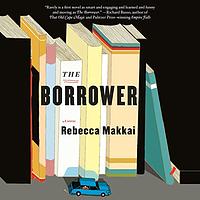Take a photo of a barcode or cover
Not many books these days keep me wanting to stay with the story, but this one did.
I loved that this truly served as a tribute to my favorite children's books, many of which involved children hitting the road, escaping parents who were disconnected, or cruel, or who simply didn't understand them. The "kids on their own" trope, whether in the Mixed up Files or Harry Potter or the many other books that employed it, is magical. Less magical is the kid with an adult accomplice spiriting him around in order to try to outrun her own discontent and alleviate her ridiculous boredom. (Do something you lazy sow! You have money, looks, autonomy and an education, your boredom is entirely your own fault.) Less magical is the journey that involves not security guards or demons, but rather Russian gangsters and creepy pseudo-relatives. Also less charming is Ian, the child at the center of the story, who makes Lucy "kidnap" him. Ian is like no child ever. As I read I wondered in Makkai had ever met an actual child. Also I wondered whether she has met an actual fundamentalist Christian. I am going to guess the answer to both questions is no.
Still, the aforementioned references to wonderful children's books, and the great characters around Lucy (her father and uncle particularly) made most of this a fun little fantasy read. 3.5 rounding up to 4 because I love books that are about loving books.
Still, the aforementioned references to wonderful children's books, and the great characters around Lucy (her father and uncle particularly) made most of this a fun little fantasy read. 3.5 rounding up to 4 because I love books that are about loving books.
This is a surprising little book, and an excellent first novel. Stop me if you've heard this one before: a young, mid-twenty something children's librarian meets a young boy, in small town America. Librarian meets boy's evangelical family, discovers that said family will only allow boy to read so-called "holy books"-- and later finds that the boy's family's idea of salvation for their child is something far more sinister.
There is so much to love about this book.
At points, the narrative simply soars-- Makkai's librarian, Lucy's, interaction with the boy, Ian, and his family are written with a starkly appealing, simple realism, and laced with a wicked sense of black humor. Toward the middle of the novel, however, when the big event happens, I wasn't initially sold. But as I continued reading, I found Makkai's writing to be rather genius, and something that resembles a modern (adult? young adult?) fairy tale. The world of "The Borrower" is very much our own-- filled with the oppression of children, the bigots who use extremist religion to justify their hatred and the salvation found in the world of fiction, the history of books. And yet the adventure that salvation takes our characters on is such it seems right out of the world of the children's novel, the fairy tale. And it suits the tale beautifully.
The final hundred or so pages of this novel are so wonderfully written they deliver an amazingly affecting ending-- one I did not expect. The culmination of our story comes at you seemingly out of nowhere-- or, at least, on a level you do not expect. It has been quite some time since I was so moved by the ending of a novel.
I expect great things to continue coming from Rebecca Makkai.
There is so much to love about this book.
At points, the narrative simply soars-- Makkai's librarian, Lucy's, interaction with the boy, Ian, and his family are written with a starkly appealing, simple realism, and laced with a wicked sense of black humor. Toward the middle of the novel, however, when the big event happens, I wasn't initially sold. But as I continued reading, I found Makkai's writing to be rather genius, and something that resembles a modern (adult? young adult?) fairy tale. The world of "The Borrower" is very much our own-- filled with the oppression of children, the bigots who use extremist religion to justify their hatred and the salvation found in the world of fiction, the history of books. And yet the adventure that salvation takes our characters on is such it seems right out of the world of the children's novel, the fairy tale. And it suits the tale beautifully.
The final hundred or so pages of this novel are so wonderfully written they deliver an amazingly affecting ending-- one I did not expect. The culmination of our story comes at you seemingly out of nowhere-- or, at least, on a level you do not expect. It has been quite some time since I was so moved by the ending of a novel.
I expect great things to continue coming from Rebecca Makkai.
Take 2 on Lolita (this time minus the ick factor): a young librarian "borrows" an unhappy bookish boy and takes him on a road trip.
A really well written first novel. I loved the characters, the writing style was original, and a really interesting plot but on finishing the book I wasn't really sure what the writer was trying to say. Hence four stars instead of five.
The Borrower is about an "accidental" children's librarian who "accidentally" kidnaps her favorite patron, at 10-year-old boy with a mother who censors his reading and who sends him to a Christian camp to try to keep him for being gay. She takes him on a long drive across the country, starting in Hannibal, Missouri. There are things I liked about this book and things I did not.
I like Ian, the boy. He is a delightful child, one I would enjoy meeting in real life. There is a plot twist toward the end involving a man who has been tailing them that amused me. The conversations between Lucy, the librarian, and Ian are often interesting and creative. I enjoyed the many literary references that are scattered throughout the book.
However, the book also contains many negative librarian stereotypes. Aside from Lucy, the "accidental" librarian, the other "real" librarians are happy to help censor reading material and have no problem violating patron confidentiality. Lucy notes that the two other women in the children's department "seemed to see the library as some kind of volunteer work, like a soup kitchen." The library director is a drunk. Lucy refers to herself as " a simple maiden lady librarian." I have to assume either the author has never met a real librarian or has met just one whom she did not like.
I recommend the later chapters, set outside the library. I do not recommend the early chapters, set inside the library. I had considered choosing this book for my book club, but I won't be.
I like Ian, the boy. He is a delightful child, one I would enjoy meeting in real life. There is a plot twist toward the end involving a man who has been tailing them that amused me. The conversations between Lucy, the librarian, and Ian are often interesting and creative. I enjoyed the many literary references that are scattered throughout the book.
However, the book also contains many negative librarian stereotypes. Aside from Lucy, the "accidental" librarian, the other "real" librarians are happy to help censor reading material and have no problem violating patron confidentiality. Lucy notes that the two other women in the children's department "seemed to see the library as some kind of volunteer work, like a soup kitchen." The library director is a drunk. Lucy refers to herself as " a simple maiden lady librarian." I have to assume either the author has never met a real librarian or has met just one whom she did not like.
I recommend the later chapters, set outside the library. I do not recommend the early chapters, set inside the library. I had considered choosing this book for my book club, but I won't be.
This book had the energy of Kevin Wilson’s nothing to see here but none of the craft. I think it may have been the author’s first book. Having just read ‘i have some questions for you’ I can confirm she improves.
That’s not to say this is a bad book. The protagonist accidentally kidnaps (borrows) a kid who is being sent to anti gay classes by his Christian parents. It’s set at a time when Russians were comical ordinary gangsters, unlike today. Lucy is a librarian and revolts against the mousey definition. The on—the-run scene went on too long. Some of the deviations read as pretentious.
I’ll be reading more of Makkai’s work.
That’s not to say this is a bad book. The protagonist accidentally kidnaps (borrows) a kid who is being sent to anti gay classes by his Christian parents. It’s set at a time when Russians were comical ordinary gangsters, unlike today. Lucy is a librarian and revolts against the mousey definition. The on—the-run scene went on too long. Some of the deviations read as pretentious.
I’ll be reading more of Makkai’s work.
This novel leads us on an improbable road trip with a wonderful (if exhausting) 10-year old Boy and his, um, Russian-American Librarian? Yes, though with the amount of pages devoted to the Librarian's self-doubt and conflict between her actions, sanity, and reality, what you want most of all is for her to just admit that she indeed kidnapped, in her own way, this child and that's a pretty unstable thing to do.
Despite a sometimes redundant narration and a far-fetched (but not magical or fantastical) foundation, there are charms to be found between these covers: the parodies/adaptations of classic children's books to this story (for example, "If You Give a Librarian a Closet) and the sweetly funny Boy himself (see "How to brush your teeth like a ten-year old boy"). And, thank God or literature, that she wraps it all up in a manner befitting the rest of the story--no jail bars, no violent drama, but a just, humorous, and still uncertain finale.
Despite a sometimes redundant narration and a far-fetched (but not magical or fantastical) foundation, there are charms to be found between these covers: the parodies/adaptations of classic children's books to this story (for example, "If You Give a Librarian a Closet) and the sweetly funny Boy himself (see "How to brush your teeth like a ten-year old boy"). And, thank God or literature, that she wraps it all up in a manner befitting the rest of the story--no jail bars, no violent drama, but a just, humorous, and still uncertain finale.
This was cute... But also file under: Never trust a book in which the protagonist shares the same highly-specific career as you. Too much suspension of disbelief.





